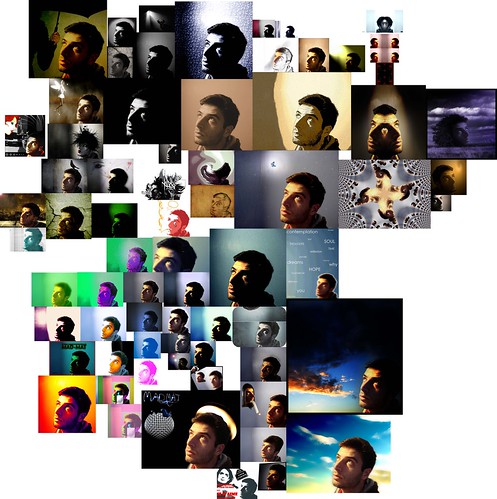Tuesday, January 29, 2008
Wanted: Teachers
While all the talk of teaching and students at Educon2.0 was enjoyable, it felt good to be back in the classroom Monday. Normally, that would be enough. This Monday was special.
Konrad Glogowski and I have been following each other's writings and thoughts for about two years. Though he tends to be immensely smarter than I, we share many ideas.
As we were leaving Educon2.0, on a whim, I asked Konrad what time he flew out Monday. Turned out he wasn't leaving until 7 pm.
Now, I'll say this plainly, my idea was to invite him to sit in one some classes. "Can I teach your class?" he asked jokingly - I'm fairly certain it was jokingly.
I'm not one to pass up a good idea.
Monday, Konrad rocked the house.
From sharing his own experience with poetry as a student to calling a student up to create an improvised poem where she opened up in what many would consider a vulnerable way, Konrad rocked the house.
After having the class walk within one block in any direction of SLA and "zoom in on what's important," we all returned to SLA's cafe and engaged in a discussion of poetry, revision, authorial choice, etc.
The thing that hit me was the fact it didn't matter to Konrad that the students spread out to write whilst the rest of the class discussed. Those same students dropped into and out of the conversation as they heard something worth their attention.
Over lunch, with several members of the SLA faculty, we debriefed. One thread of the discussion was on the use of space within SLA. Our classrooms extend beyond their 4 conventional walls. On any given day, my students can be found in cubbies, nooks, offices, hallway tables and floors outside my room learning.
I know this isn't unique. I'm glad it's not. The thing that struck me about the goings on during Konrad's lesson and the thoughts batted about during lunch, were the commonalities in our styles, our approaches and beliefs.
This speaks to my and Chris' contention that SLA is not unique. Chris said at Sunday's panel discussion that we sadly rare, but I'm not certain that is true either. We know how to connect, how to tell our story, how to engage with other like-minded individuals, and we're learning how to do each of those things more effecitvely. Our drive to tell our story may be the rarity. I have to believe that great things are happening in many classrooms and schools around the world; they just don't know how to talk about it yet.
What happened Monday was a first for me. Try it. Find a teacher in your network and invite them to teach your class. This could be via skype, via chat, via ustream, whatever method you choose. And, if I am part of your network, I offer this open invitation - come teach my class.
Thursday, January 17, 2008
Spencer Wells Comes to SLA - Live Blogged
Dr. Spencer Wells, Explorer in Residence at NG, heads Human Genographic Project

Goal is to answer the simple question of where people come from. Polled immigrant students on where their parents came from. How different are we, really?
Population geneticist - field trying to figure out the answer to that question.
How do you explain the patterns of human diversity?
Broken into sub-questions:
Are we, in fact, all related to each other?
how did we come to populate every corner of the globe and generate the diversity we see?
Darwin's second book, the Descent of man. In each great region of the world the living...
Darwin answered the question over a century ago, "We came from Africa." But Darwin was talking about ancient ancestry. Didn't address the issue of humans. He was talking about things that happened a long time ago.
Apes appear in Africa 23 million years ago.
Fist African exodus 15 million years ago.
We want to know about the origins of the human species, not apes.
Paleoanthropology - digging things up out of the ground and determining ancestry based on shape. Actually relies on very little data. Completely changes the interpretations of where we came from. Three species of hominids found in the same place. Were living in the same place in the same time. Don't know which we actually descended from.
Usually use shape as the only data. Linneas first gave us binomial nomenclature.
The question of origin is really a genealogical question.
3 billion units of DNA in each human cell.
Nice job of comparing copying a book by hand to copying of genetic material.
When they get passed down through the generations, they become markers of descent.
People are 99.9% the same. comparing genographic information from five people to search for variation.
Imagine the DNA sequences are like real words. We're looking at the variable information.
"FIX" and "CAT"
We count the number of changes to get us back to the common ancestor "DOG."
Africans have been accumulating these mutational changes longer than any other group of people. This means Darwin was correct and humans started in Africa. Left Africa 60,000 years ago.
Showing a map of believed migratory paths.
Book, The Journey of Man and PBS film of the same title.
Genographic Project:
Regional offices with the goal of sampling indigenous people.
Between 100 and 300 million indigenous people in the world.
Can go on website and get yourself tested.
Net proceeds to legacy fund to help the indigenous tribes maintain educational and cultural programs.
Migrating from homelands to dominant cultures means a sacrifice of culture. About 6,000 languages spoken in the world today. Maybe only 500-600 languages spoken by the end of the century.
Indigenous cultures tell us about natural sources for treatment medicines. Losing cultural knowledge means losing links to important information.
Participants get deeper knowledge.
Showing information from Miss Hull. Showing a map of the migration of Hull's ancestors. Amazing. Her ancestors killed off the Neanderthals. Traced back to a single female ancestor, most successful female group.
Q&A:
Evolved more in the last 10,000 years than we did in the prev. 100,000.
We will be giving up hunter gatherers because of globalization.
Science and Religion: As a scientist, you have to stay away from religion and be as objective as you can. Average Brazilian has no idea what their ancestry is.
Are we turning back into monkeys? No evidence we are devolving.
Interesting question to end on.
Image Credit: http://einside.kent.edu/files/Feb192007/spencerwellscrop.jpg

Goal is to answer the simple question of where people come from. Polled immigrant students on where their parents came from. How different are we, really?
Population geneticist - field trying to figure out the answer to that question.
How do you explain the patterns of human diversity?
Broken into sub-questions:
Are we, in fact, all related to each other?
how did we come to populate every corner of the globe and generate the diversity we see?
Darwin's second book, the Descent of man. In each great region of the world the living...
Darwin answered the question over a century ago, "We came from Africa." But Darwin was talking about ancient ancestry. Didn't address the issue of humans. He was talking about things that happened a long time ago.
Apes appear in Africa 23 million years ago.
Fist African exodus 15 million years ago.
We want to know about the origins of the human species, not apes.
Paleoanthropology - digging things up out of the ground and determining ancestry based on shape. Actually relies on very little data. Completely changes the interpretations of where we came from. Three species of hominids found in the same place. Were living in the same place in the same time. Don't know which we actually descended from.
Usually use shape as the only data. Linneas first gave us binomial nomenclature.
The question of origin is really a genealogical question.
3 billion units of DNA in each human cell.
Nice job of comparing copying a book by hand to copying of genetic material.
When they get passed down through the generations, they become markers of descent.
People are 99.9% the same. comparing genographic information from five people to search for variation.
Imagine the DNA sequences are like real words. We're looking at the variable information.
"FIX" and "CAT"
We count the number of changes to get us back to the common ancestor "DOG."
Africans have been accumulating these mutational changes longer than any other group of people. This means Darwin was correct and humans started in Africa. Left Africa 60,000 years ago.
Showing a map of believed migratory paths.
Book, The Journey of Man and PBS film of the same title.
Genographic Project:
- Global DNA sampling
- Public participation
- A Legacy Fund
Regional offices with the goal of sampling indigenous people.
Between 100 and 300 million indigenous people in the world.
Can go on website and get yourself tested.
Net proceeds to legacy fund to help the indigenous tribes maintain educational and cultural programs.
Migrating from homelands to dominant cultures means a sacrifice of culture. About 6,000 languages spoken in the world today. Maybe only 500-600 languages spoken by the end of the century.
Indigenous cultures tell us about natural sources for treatment medicines. Losing cultural knowledge means losing links to important information.
Participants get deeper knowledge.
Showing information from Miss Hull. Showing a map of the migration of Hull's ancestors. Amazing. Her ancestors killed off the Neanderthals. Traced back to a single female ancestor, most successful female group.
Q&A:
Evolved more in the last 10,000 years than we did in the prev. 100,000.
We will be giving up hunter gatherers because of globalization.
Science and Religion: As a scientist, you have to stay away from religion and be as objective as you can. Average Brazilian has no idea what their ancestry is.
Are we turning back into monkeys? No evidence we are devolving.
Interesting question to end on.
Image Credit: http://einside.kent.edu/files/Feb192007/spencerwellscrop.jpg
Tuesday, January 15, 2008
On Editing
 Our 9th Graders are working on fractured fairy tales for their benchmark. Last night's homework was to complete their rough drafts. Because these will be incorporated into children's picture books, there's a word limit of 500. It does an English teacher's heart good to have students complaining they absolutely cannot write anything under 596 words.
Our 9th Graders are working on fractured fairy tales for their benchmark. Last night's homework was to complete their rough drafts. Because these will be incorporated into children's picture books, there's a word limit of 500. It does an English teacher's heart good to have students complaining they absolutely cannot write anything under 596 words.In an effort to stem the onset of AEP (Adolescent Editing Phobia), I'm turning back to my roots - my college roots.
There were a few things I garnered from my formal college education, truly a few. One of them was comparative adverbial forms such as, "He slowed down more slowly than she did." The other was from Professor Bob Broad - The Writer's Memo.
I remember writing my first memo in Broad's class. I remember thinking it was a complete waste of time. I remember getting my draft back with memo and comments and realizing I had just learned something about editing.
Today, my 9th graders will be turning in their rough drafts, writing their memos and trading papers. I'm hoping for goodness. I realize not every student is going to get as much out of the writers memo as I did. Still, I'm hoping it will be a start to a larger conversation over what it takes to truly get worthwhile peer review happening on a draft.
If not, I'll move on to comparative adverbial phrases.
More later.
Image credit: http://flickr.com/photos/skylover/455669442/
Blogged with Flock
Monday, January 14, 2008
Frustrations in Radioland
 My 2.0 tools are running into Beta problems.
My 2.0 tools are running into Beta problems.Currently, my tenth graders are working on creating podcasts in the vein of "This American Life" by interviewing and recounting the stories of people they may or may not know around the theme of sacrifice. This all ties back to the plight of Janie from Zora Neal Hurston's Their Eyes Were Watching God.
We spent days listening to stories and watching some superb material from Current posted on Youtube where Ira Glass explains storytelling. We deconstructed, timelines were created, and now...
A handful of students are creating some superb content. The majority look at me in class as though I'm completely unreasonable not lower my expectations.
The thing is, my frustration comes from my inability to take them any further in the process. At some point, I have to say, "That's all the scaffolding I can provide." My frustration comes from giving them all the tools I can to help them succeed and then having to step back. My frustration comes from realizing I can't actually do the work for them and achieve the ultimate goal.
Many of my students have decided their success depends on an external locus of control. Mainly, this happens when they come to the portion where they must edit the material they've collected. As much as I warned, (and it often included much failing about whilst speaking) many of the students approached editing as though it were an afterthought. This is not at all unlike their approach to editing in the writing process. Unfortunately they come to the rather stark realization that this whole process takes supreme amounts of focus. At that point, any number of reasons are batted about as to why they cannot complete the project.
One class' audio is due tomorrow. I'm not sure what to expect.
The question that circles in my head is what can be done? This is not a new problem - for me or any educator. And so, here's the point of reflection, what's to be done?
If nothing else, the situation is a lovely example of the fact it's not the tools that get kids to succeed.
And then...
As I finished typing the last sentence a student walked in to ask where he needed to return the Snowball mic he had been using. The student had been working for two-and-a-half hours to translate an interview he'd done with his father about the decision to move his family from Bangladesh 5 years ago and the effect it had on the student.
Mind you, this is a student I've seen limited academic work from thus far, mainly because the academic vocabulary develops so much more slowly than the conversational vocabulary. He's here, two-and-a-half hours after school ended. That's never happened with a traditional writing assignment.
Maybe I'm not doing everything right, but maybe I'm doing something right.
More later.
Image from http://flickr.com/photos/perikita/141716937/
Labels:
frustration,
podcasting,
school2.0,
sla,
this american life
Monday, January 07, 2008
Pownce!
 My inbox held this message last night:
My inbox held this message last night:You're invited to Pownce!
I'd forgotten I'd signed up for an invite to Pownce a little over a month ago. In fact, I'd forgotten what it was. Given the pace at which tools hit the web, I'm hesitant to try many things out. Pownce wins.
Think of it as "Twitter on steroids" as Marcie said. The setup is similar, but it's also ready with a desktop app that runs on Adobe AIR.
The big draw for me is the range of tools Pownce brings to the table:
- No 140-character limit which was cute in the beginning, but frustrating when I need to say something more intricate.
- 10 MB file transfer capabilities (100 MB if you pony up the $20/yr. for a pro account)
- Link posting capabilities (I know this is easy in twitter, but it's still nice.)
- Event posting capabilities.
So, I've a few invites left for Pownce for those who are interested (It's still in Beta, so admission is invite-only). As soon as the network's big enough, I'll be deleting my twitter account. Yeah, that's how much I believe in it.
It will be interesting to see if/how soon this app gets snatched up by the likes of Google, Myspace, Facebook or the like.
Subscribe to:
Posts (Atom)